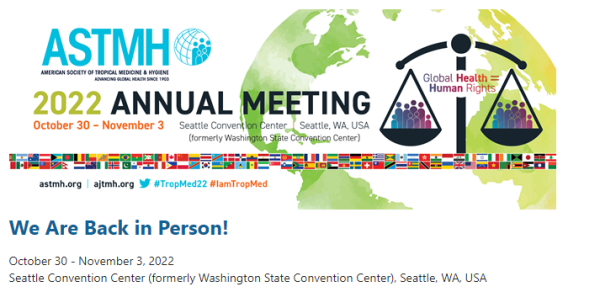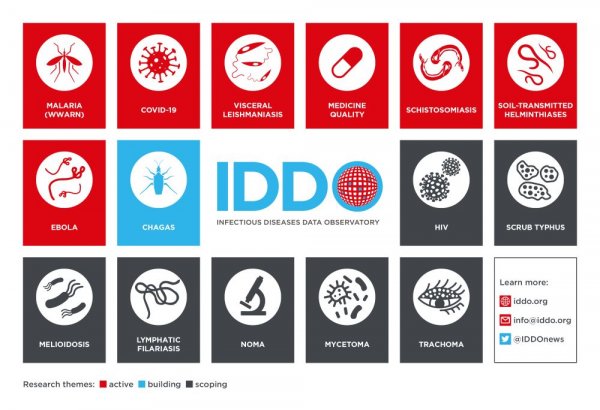IDDO’s Director recognised as an ASTMH Distinguished International Fellow for 2022
IDDO’s Director Professor Philippe Guérin has been awarded the ASTMH Distinguished International Fellow at this year’s conference in Seattle, USA.

The award recognises up to eight individuals who have made eminent contributions to a particular aspect of tropical medicine/global health or hygiene.
Professor Guérin was instrumental in setting up the Worldwide Antimalarial Network (WWARN) in 2009, and later the Infectious Diseases Data Observatory (IDDO) to generate new research evidence from existing data and put equity for global researchers at the forefront. IDDO delivers collaborative analyses with the wider scientific community by harmonising disparate data and works to improve outcomes for infectious disease-affected communities worldwide.
The ASTMH honour is awarded only after careful consideration by their Distinguished International Fellow Committee and approval by the ASTMH Board of Directors.
Previously, Professor Guérin worked in the field for Médecins Sans Frontières and as a researcher for a Wellcome Trust Research Unit in many countries in Africa and Asia. Following three years as a Senior Advisor to the Department of Infectious Disease Epidemiology at the Norwegian Institute of Public Health, Philippe joined Épicentre in Paris – a World Health Organization (WHO) Collaborating Centre for Research in epidemiology and response to emerging diseases. Philippe served as Scientific Director for six years at Épicentre before moving to WWARN.
IDDO welcomes researchers from India
It was great to welcome researchers Dr Vijayakumar Balakrishnan (ICMR-VCRC), Dr Hemant Mahajan (ICMR-RMRIMS) to IDDO to update on their work across malaria, visceral leishmaniasis, and filariasis.
IDDO is building a partnership with the Indian Council of Medical Research (ICMR) to exchange and share ideas with India’s scientific research community.

Dr Balakrishnan and Dr Hemant Mahajan were in the UK to attend a ‘mathematical modelling for the control of infectious diseases’ course, supported by the IDDO ICMR grant, and took time out to travel to Oxford and meet with IDDO colleagues.
Earlier this year the Indian government’s Union Cabinet, chaired by Prime Minister Shri Narendra Modi, approved a Memorandum of Understanding (MoU) between the Indian Council of Medical Research (ICMR) and the Infectious Diseases Data Observatory (IDDO), based at the University of Oxford.
The MoU will build a partnership both in and beyond data and skill-sharing and support capacity development with India’s scientific research community. It will ensure that data collection is compliant with international standards and regulatory requirements. Both ICMR and IDDO will exchange and share ideas on emerging infections and three vector-borne diseases in the elimination phase: malaria, visceral leishmaniasis, and filariasis.
Working together, both parties will support and develop best practices for data management, data documentation, data sharing and the development of equitable governance frameworks. The partnership will also explore opportunities for collaboration on research programmes and develop a three-year work plan on capacity strengthening, an exchange of research fellows, training on data management and statistical analysis.
Professor Philippe Guérin, Director of IDDO, said: “We are delighted to partner with the Indian Council of Medical Research and look forward to sharing expertise and strengthening our collaboration. Recent major public health events have shown just how effective shared knowledge and skills can be, and how crucial it is for the international scientific research community to continue to work together ever more closely. This partnership provides early career researchers with a fantastic opportunity to enhance their skills and improve treatment outcomes for affected communities.”
Find out more about the MoU here.

Dr James Wilson is an infectious diseases and internal medicine physician in the UK. In October 2022 he started a PhD with the Infectious Diseases Data Observatory and the Oxford Centre for Tropical Medicine and Global Health. Under the supervision of Professor Philippe Guerin, Dr Kasia Stepniewska and Dr Prabin Dahal, his PhD will explore clinical trial data in visceral leishmaniasis, specifically the application of individual-patient data (IPD) meta-analysis to better understand heterogeneity in patient outcomes.
James obtained his undergraduate degree in physics at Oxford University before completing a masters in medical statistics at the London School of Hygiene and Tropical Medicine and graduate entry medicine at Warwick University (MbChB). He has subsequently been working as a clinician in London and Manchester, during which time he has completed a diploma in tropical medicine and hygiene (DTM&H) and spent time investigating novel TB diagnostics in Perú.
IDDO attending ASTMH
Come and meet us at this year’s ASTMH 71st Annual Meeting - the first fully in-person meeting since 2019. Thousands of delegates are expected to attend with leading global health researchers from more than 111 countries around the world. During the conference we have several posters, talks, meetings and symposia across malaria, visceral leishmaniasis and medicine quality.

This year IDDO will be at stand #104, as part of Oxford Tropical Medicine. Come and see us to find out about more about our research, data platforms and latest work.
Among our research at ASTMH is:
Monday, October 31, Poster session A, 11.00am – 12.45pm
- Dr Rob Commons – Poster #268, Effect of primaquine dose on the risk of recurrence in patients with uncomplicated Plasmodium vivax: an individual patient data meta-analysis
- Dr Sauman Singh – Poster #476, Post-kala-azar dermal leishmaniasis drug efficacy study landscape: a systematic review of clinical and observational studies to assess the feasibility of establishing an individual participant-level data platform
- Dr Sabina Dahlström Otienoburu – Poster # LB-5117, Poster Spatiotemporal spread of Plasmodium falciparum mutations for resistance to sulfadoxine-pyrimethamine across Africa, 1990 – 2020
- Megha Rajasekhar – Poster #271, Effect of primaquine daily dose on tolerability and safety in patients with uncomplicated Plasmodium vivax: an individual patient data meta-analysis
Tuesday, November 1, Poster session B, 12 - 1:45pm
- Dr Caitlin Naylor and Gemma Buck - Poster #1055, Standardisation of data with annotated Case Report Forms for use in Visceral Leishmaniasis clinical trials in patients with and without HIV co-infection
Thursday, November 4, Oral scientific session #132 Kinetoplastida and Other Opportunistic and Anaerobic Protozoa: Epidemiology, at the Convention Center – Room 605/610 (6th Floor), 8am – 9.45am
- Presented by Professor Philippe Guerin on behalf of Dr Prabin Dahal and Rutuja Chhajed “Estimating the Proportion of Relapse following Treatment of Visceral Leishmaniasis (VL): Meta analysis using Infectious Diseases Data Observatory (IDDO) Living Systematic Review”
If you are not able to join us in-person then why not follow what is happening at the conference over Twitter by following us on @IDDOnews
Read our latest news or email info@iddo.org with your questions.
Case report form for VL HIV coinfection
Join IDDO at this year’s WorldLeish7 conference
Taking place in Cartagena, Colombia, the WordLeish7 Conference reunites the visceral leishmaniasis (VL) scientific and research community in-person for the first time in four-years.
Organised by the PECET – Programa de Estudio y Control de Enfermedades Tropicales of the Universidad de Antioquia, Colombia, the conference runs from August 1 to 6, and aims to highlight new research, advances in treatment for VL and facilitate networking.
The conference includes a mix of keynote speakers, symposiums, pre-congress courses, poster presentations, meetings for thematic alliances and awards for student presentations.
Look out for IDDO’s presentations and poster sessions, including our symposium, #29, titled ‘A Global Visceral Leishmaniasis Data Platform’, which takes place on Thursday, August 4, from 11.30am to 1pm (COT) and will be led by IDDO’s Director Philippe Guerin and key members and observers of the IDDO Visceral Leishmaniasis (VL) Data Platform Scientific Advisory Committee (SAC). The presentations are:
- Professor Mitali Chatterjee, of the Institute of Postgraduate Medical Education & Research (IPGMER), who will discuss key challenges and opportunities
- Professor Ahmed Mudawi Musa, of the University of Khartoum, who will talk about Optimising historical data and planning prospectively
- Dr Fabiana Alves, of Drugs for Neglected Diseases initiative (DNDi), who discusses the Data platform potential for drug development
- Dr Saurabh Jain, World Health Organisation, who will talk about Impact on Policy
- Professor Philippe Guérin, IDDO Director, who will talk about the Future benefits of the VL Data Platform for research
Also from IDDO, Dr Caitlin Naylor will present the work of a global collaboration of the visceral leishmaniasis (VL) community to develop freely available, annotated VL case report forms (CRF) to accelerate research both into uncomplicated VL, and for patients with HIV-VL co-infection. The presentation takes place on Friday, August 5, in oral communications session 31, from 3.30pm to 4.30pm (COT) and is titled: Standardisation Of Data With Annotated Case Report Forms For Use In Visceral Leishmaniasis Clinical Trials In Patients With Or Without HIV Coinfection.
IDDO’s researchers will also present the following posters:
- Rutuja Chhajed - ‘Estimating the proportion of relapse following treatment of Visceral Leishmaniasis (VL): Meta-analysis using IDDO living systematic review’ at poster session 2 on Wednesday, August 3, from 3.30pm to 4.30pm (COT)
- Dr Prabin Dahal – presents two posters, these are ‘Visceral Leishmaniasis in pregnancy: a systematic review’ at poster session 2 on Wednesday, August 3, from 3.30pm to 4.30pm (COT) and ‘Methodological variation in design and conduct of clinical studies in Visceral Leishmaniasis: A systematic review of published literature, 1980-2021’; at poster session 3, on Thursday, August 4, from 1pm to 2pm (COT)
- Dr Sauman Singh – ‘Post-kala-azar dermal leishmaniasis (PKDL) drug efficacy study landscape: a systematic review of clinical and observational studies to assess the feasibility of establishing an individual participant-level data (IPD) platform’ poster session 2 on Wednesday, August 3, from 3.30pm to 4.30pm (COT)
For more information or to view the conference agenda view the WorldLeish7 website

Rutuja is a Biomedical Engineer from the Indian Institute of Technology and has recently finished her MSc in International Health and Tropical Medicine at the University of Oxford.
Rutuja has worked at the intersection of engineering, data science and public health on projects ranging from developing health monitoring systems for neonates in rural settings to tools like fortification simulation dashboards for the Indian government.
She is currently working with the Infectious Disease Data Observatory (IDDO), University of Oxford, as a Scientific Coordinator based in New Delhi, on its research activities on visceral leishmaniasis (VL), lymphatic filariasis and malaria. She is also working with the science team supporting research activities in VL, in statistical analysis of the clinical trials data to address knowledge gaps in VL diagnosis and treatment.
Data Tools
IDDO’s Data Team has developed a collection of resources to support researchers working with health data.

Our data tools include information on how IDDO curates datasets to the CDISC SDTM data model for pooling in the IDDO Data Repository, as well as downloadable relevant documentation, links to analysis documents, videos and frequently asked questions.
Explore our full set of data tools which include:
-
IDDO SDTM Implementation Guide
Download our guide on how IDDO curates datasets to the CDISC SDTM data model for pooling in the IDDO Data Repository.
-
Frequently Asked Questions
Read more about where to find data or variables of interests for particular disease themes.
-
Reference Documentation
Download relevant documentation (e.g., annotated CRFs) [“Reference Documentation”].
New users: please note that registration is required before accessing these resources.
Infectious diseases data observatory (IDDO) visceral leishmaniasis library of clinical therapeutic studies: A protocol for a living systematic review of clinical studies [version 1; peer review: awaiting peer review]
Abstract
Introduction:
Visceral leishmaniasis (VL) is a vector-borne disease caused by protozoan parasites of the genus Leishmania. The disease is endemic in parts of South Asia, East Africa, South America and the Mediterranean region, with an estimated 50,000 to 90,000 cases occurring annually. A living systematic review of existing scientific literature is proposed to identify clinical drug efficacy studies against VL, conducted following the Preferred Reporting Items for Systematic-Reviews and Meta-Analyses (PRISMA) guidelines.
Methods and analysis:
The proposed living systematic review builds on a previous systematic review first carried out in 2016, and the current protocol is designed to capture any published or registered VL clinical study from Nov-2021 onwards. The following databases will be searched by a medical librarian: PubMed, Ovid Embase, Scopus, Web of Science Core Collection, Cochrane Central Register of Controlled Trials, clinicaltrials.gov, WHO ICTRP, as well as IMEMR, IMSEAR, and LILACS from the WHO Global Index Medicus. The systematic review will consider both randomised and non-randomised interventional studies, including single-armed studies.
Ethics and dissemination:
A database of eligible studies, including study characteristics, is openly available (https://www.iddo.org/tool/vl-surveyor) and will be continually updated every six months. All findings will be published in a peer-reviewed journal.
PROSPERO registration:
CRD42021284622 (29/11/2021)
IDDO’s latest newsletter is out
Find out more about what we’ve been up to in our latest newsletter. There are updates on our COVID-19 research, including our collaboration with ISARIC, which has assembled the world’s largest global database on COVID-19 clinical data.

There’s news too on our recently updated COVID-19 living systematic review, an open-access visual database of COVID-19 global registered trials which was developed in collaboration with the COVID-19 Clinical Research Coalition.
Other highlights include a memorandum of understanding signed with Indian authorities for a data and skill-sharing partnership between the Indian Council of Medical Research and IDDO; and the largest-ever malaria meta-analysis on pooled individual patient data involving over 70,000 patients recently published in BMC Medicine.
Our VL platform has also been very busy, publishing a series of systematic reviews which have identified a gender imbalance in clinical trials, insufficient reporting of serious adverse events and the underreporting of VL in pregnant women. The platform has also launched two study groups on anaemia among patients with VL and haematological dynamics post treatment, and host parasite and drug determinants of therapeutic responses.
Also featured in this latest newsletter are updates on our work on scrub typhus, Chagas disease, febrile illness and medicine quality.
